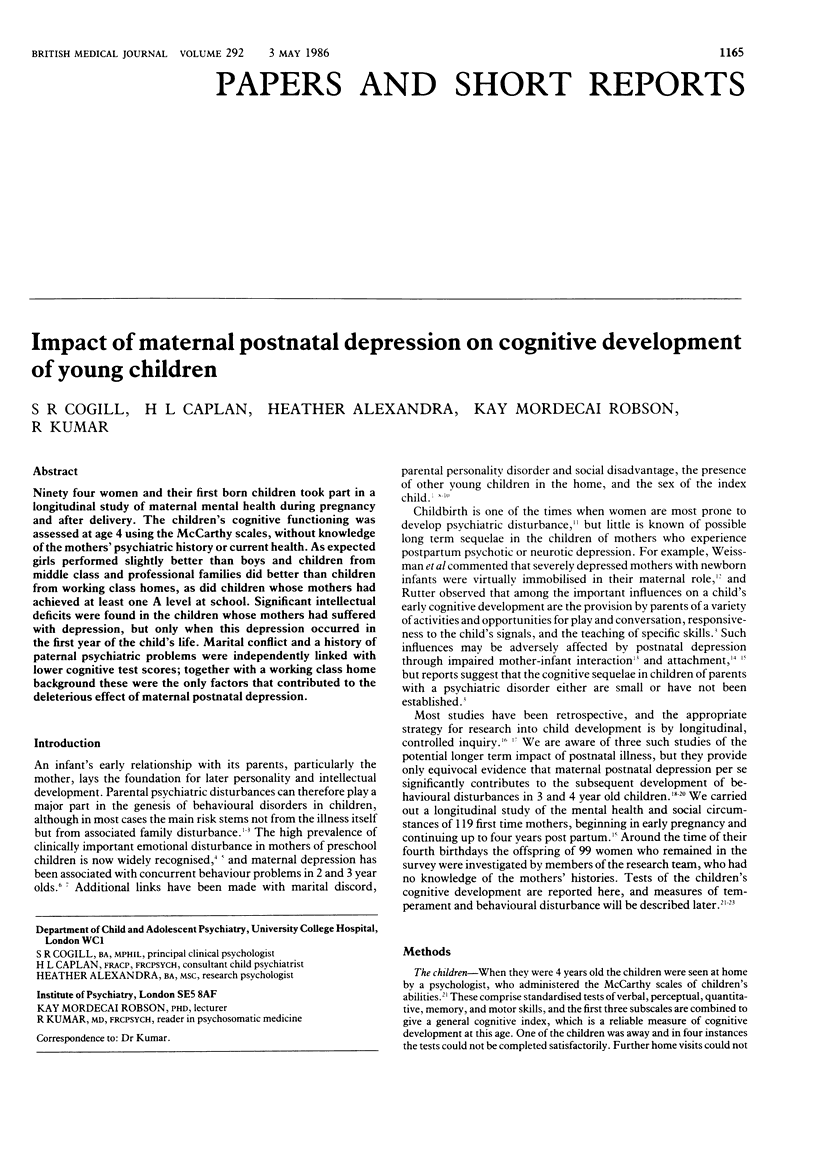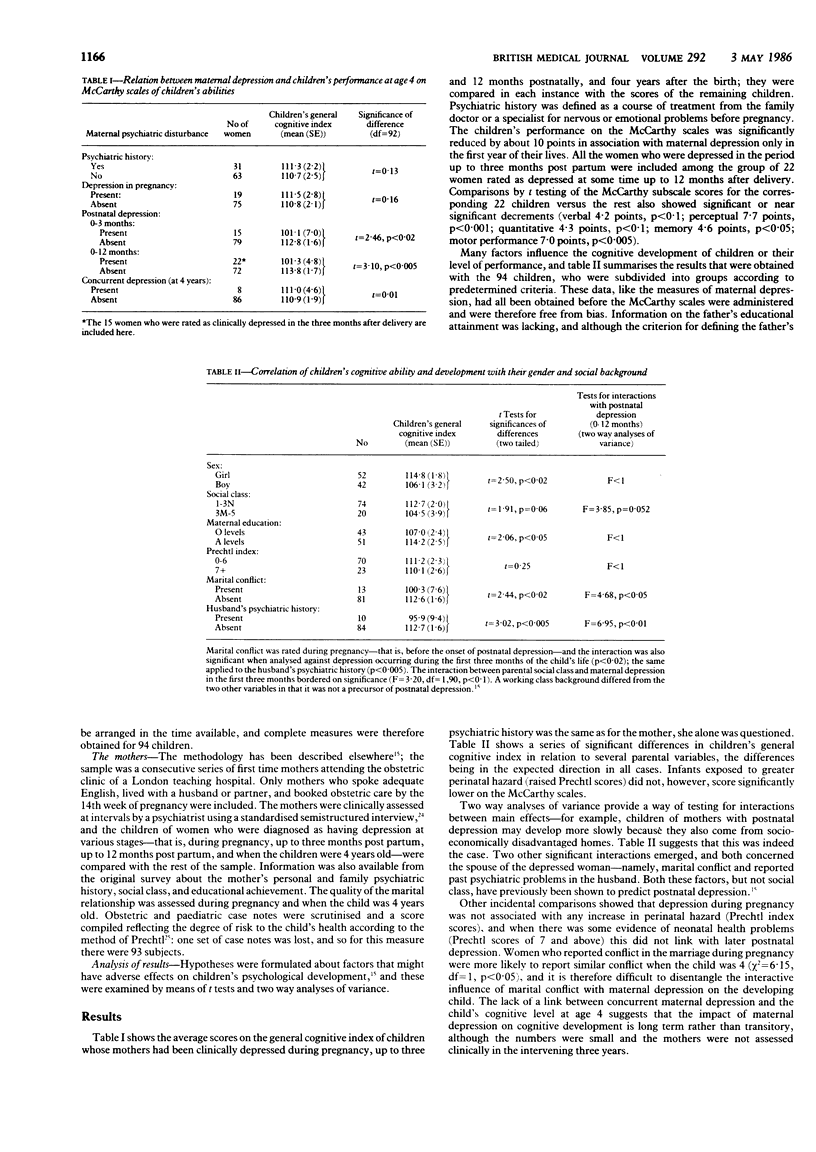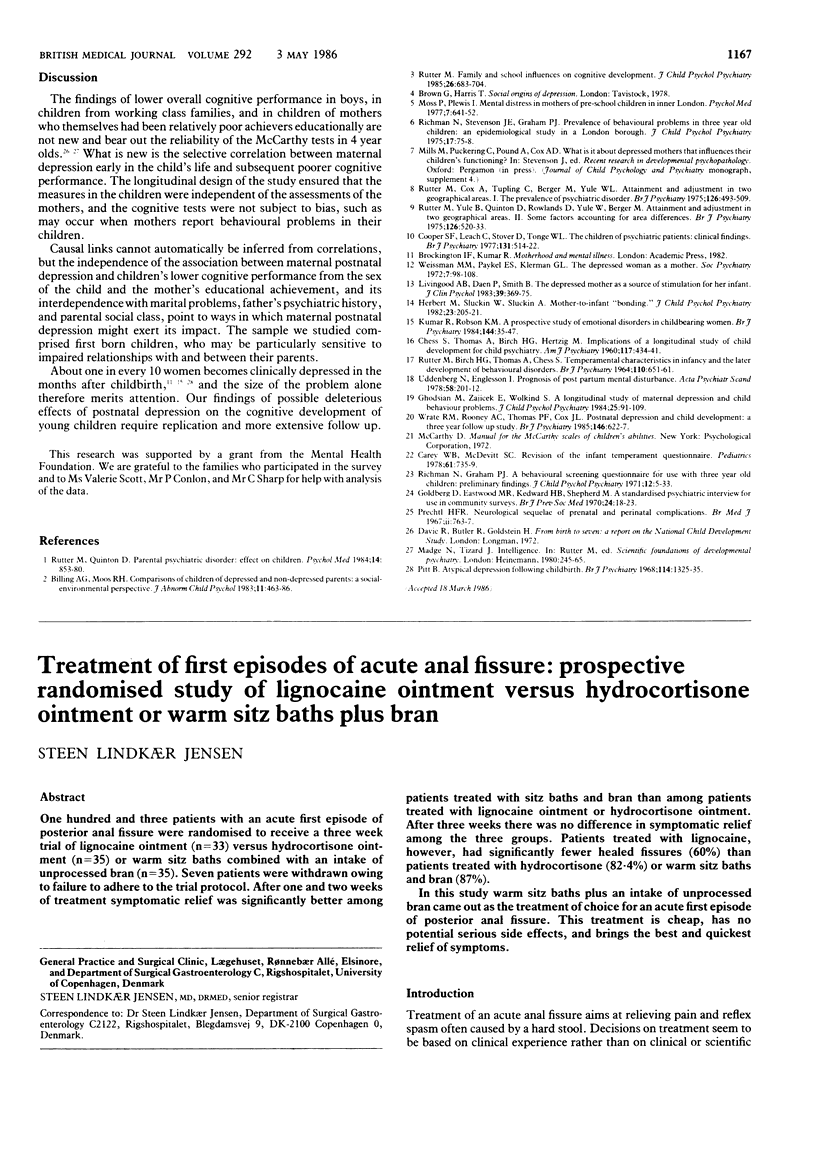Abstract
Ninety four women and their first born children took part in a longitudinal study of maternal mental health during pregnancy and after delivery. The children's cognitive functioning was assessed at age 4 using the McCarthy scales, without knowledge of the mothers' psychiatric history or current health. As expected girls performed slightly better than boys and children from middle class and professional families did better than children from working class homes, as did children whose mothers had achieved at least one A level at school. Significant intellectual deficits were found in the children whose mothers had suffered with depression, but only when this depression occurred in the first year of the child's life. Marital conflict and a history of paternal psychiatric problems were independently linked with lower cognitive test scores; together with a working class home background these were the only factors that contributed to the deleterious effect of maternal postnatal depression.
Full text
PDF


Selected References
These references are in PubMed. This may not be the complete list of references from this article.
- Billings A. G., Moos R. H. Comparisons of children of depressed and nondepressed parents: a social-environmental perspective. J Abnorm Child Psychol. 1983 Dec;11(4):463–485. doi: 10.1007/BF00917076. [DOI] [PubMed] [Google Scholar]
- CHESS S., THOMAS A., BIRCH H. G., HERTZIG M. Implications of a longitudinal study of child development for child psychiatry. Am J Psychiatry. 1960 Nov;117:434–441. doi: 10.1176/ajp.117.5.434. [DOI] [PubMed] [Google Scholar]
- Carey W. B., McDevitt S. C. Revision of the Infant Temperament Questionnaire. Pediatrics. 1978 May;61(5):735–739. [PubMed] [Google Scholar]
- Cooper S. F., Leach C., Storer D., Tonge W. L. The children of psychiatric patients: clinical findings. Br J Psychiatry. 1977 Nov;131:514–522. doi: 10.1192/bjp.131.5.514. [DOI] [PubMed] [Google Scholar]
- Ghodsian M., Zajicek E., Wolkind S. A longitudinal study of maternal depression and child behaviour problems. J Child Psychol Psychiatry. 1984 Jan;25(1):91–109. doi: 10.1111/j.1469-7610.1984.tb01721.x. [DOI] [PubMed] [Google Scholar]
- Goldberg D. P., Cooper B., Eastwood M. R., Kedward H. B., Shepherd M. A standardized psychiatric interview for use in community surveys. Br J Prev Soc Med. 1970 Feb;24(1):18–23. doi: 10.1136/jech.24.1.18. [DOI] [PMC free article] [PubMed] [Google Scholar]
- Herbert M., Sluckin W., Sluckin A. Mother-to-infant bonding. J Child Psychol Psychiatry. 1982 Jul;23(3):205–221. doi: 10.1111/j.1469-7610.1982.tb00068.x. [DOI] [PubMed] [Google Scholar]
- Kumar R., Robson K. M. A prospective study of emotional disorders in childbearing women. Br J Psychiatry. 1984 Jan;144:35–47. doi: 10.1192/bjp.144.1.35. [DOI] [PubMed] [Google Scholar]
- Livingood A. B., Daen P., Smith B. D. The depressed mother as a source of stimulation for her infant. J Clin Psychol. 1983 May;39(3):369–375. doi: 10.1002/1097-4679(198305)39:3<369::aid-jclp2270390310>3.0.co;2-8. [DOI] [PubMed] [Google Scholar]
- Moss P., Plewis I. Mental distress in mothers of pre-school children in inner London. Psychol Med. 1977 Nov;7(4):641–652. doi: 10.1017/s0033291700006292. [DOI] [PubMed] [Google Scholar]
- RUTTER M., BIRCH H. G., THOMAS A., CHESS S. TEMPERAMENTAL CHARACTERISTICS IN INFANCY AND THE LATER DEVELOPMENT OF BEHAVIOURAL DISORDERS. Br J Psychiatry. 1964 Sep;110:651–661. doi: 10.1192/bjp.110.468.651. [DOI] [PubMed] [Google Scholar]
- Rutter M., Cox A., Tupling C., Berger M., Yule W. Attainment and adjustment in two geographical areas. I--The prevalence of psychiatric disorder. Br J Psychiatry. 1975 Jun;126:493–509. doi: 10.1192/bjp.126.6.493. [DOI] [PubMed] [Google Scholar]
- Rutter M. Family and school influences on cognitive development. J Child Psychol Psychiatry. 1985 Sep;26(5):683–704. doi: 10.1111/j.1469-7610.1985.tb00584.x. [DOI] [PubMed] [Google Scholar]
- Rutter M., Quinton D. Parental psychiatric disorder: effects on children. Psychol Med. 1984 Nov;14(4):853–880. doi: 10.1017/s0033291700019838. [DOI] [PubMed] [Google Scholar]
- Rutter M., Yule B., Quinton D., Rowlands O., Yule W., Berger M. Attainment and adjustment in two geographical areas: III--Some factors accounting for area differences. Br J Psychiatry. 1975 Jun;126:520–533. doi: 10.1192/bjp.126.6.520. [DOI] [PubMed] [Google Scholar]
- Uddenberg N., Englesson I. Prognosis of post partum mental disturbance. A prospective study of primiparous women and their 4 1/2-year-old children. Acta Psychiatr Scand. 1978 Sep;58(3):201–212. doi: 10.1111/j.1600-0447.1978.tb06933.x. [DOI] [PubMed] [Google Scholar]
- Wrate R. M., Rooney A. C., Thomas P. F., Cox J. L. Postnatal depression and child development. A three-year follow-up study. Br J Psychiatry. 1985 Jun;146:622–627. doi: 10.1192/bjp.146.6.622. [DOI] [PubMed] [Google Scholar]


